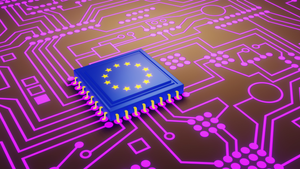The music industry has welcomed the news that, on Friday, European Union member states approved the final draft of the EU AI Act. The new legislation seeks to regulate many different uses of artificial intelligence and includes some measures that are relevant to generative AI, which is of most interest to the music industry.
Among those heralding the news was John Phelan, the Director General of the International Confederation Of Music Publishers, who says that the new legislation provides the protection creators and copyright owners need against "the recent wave of AI companies who refuse to observe laws and are illegally acquiring the world’s music to train their models". And, once in force in Europe, it will "have a ripple effect internationally”.
There were fears that some elements of the AI Act - including those around transparency - might be watered down at the final stage, with certain EU member states seeking further changes. However, the last holdout, France, dropped its opposition last week after securing some concessions. The act now needs to be ratified by the European Parliament.
ICMP specifically welcomes three key aspects of the act. First, that "AI companies must observe EU copyright law”. Second, that "AI companies must increase transparency to the music industry as to whether music was used for training models or generative AI output". And third, "once generative AI output such as music or video hits the EU, obligations will apply to retain detailed documentation on what content was used to train the model - irrespective of where in the world the training took place".
Commenting further, Phelan says that, while AI isn't new, "what is new is the recent wave of AI companies who refuse to observe laws and are illegally acquiring the world’s music to train their models and feed generative AI. Simply put, there isn’t a music company or music-maker anywhere unharmed by such practices".
"ICMP has been fighting for the EU AI laws to include robust protections", he adds. The final version of the act agreed on Friday "includes those protections. The EU AI Act will reinforce the reality of the relationship between copyright laws and tech – general purpose AI companies must not use music without permission, are obliged to secure authorisation, they must stop illegal scraping and they must retain technical documentation on how they are training their models".
Speaking for the record companies, the International Federation Of The Phonographic Industry says that last week's approval of the AI Act "marks an important step forward in helping to protect creators in the AI environment. AI offers creators both opportunities and risks, and we believe there is a path to a mutually successful outcome for both the creative and technology communities. Success requires guardrails – public policies that enable and require responsible AI. We urge the European Parliament to approve this first-of-its-kind legislation without delay".

